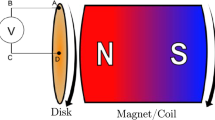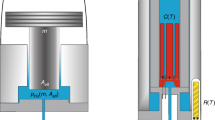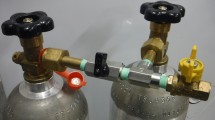Abstract
ABSOLUTE measurements of high voltages, up to about 300 kilovolts, have been carried out by various workers using instruments of the attracted disk type, as originally devised by Lord Kelvin, in which the electrostatic deflecting force on the disk is balanced by mechanical means. When such instruments are operated in air, large spacings are necessary for the higher voltages, and difficulties arise in the production of a uniform field without the use of excessively large electrode diameters. This has been overcome to some extent by one group of workers1, who have enclosed the cylindrical space between the electrodes with a series of guard-rings. In another arrangement2, the apparatus is operated in compressed gas, with a consequent reduction in the spacing between the electrodes for a given voltage.
This is a preview of subscription content, access via your institution
Access options
Subscribe to this journal
Receive 51 print issues and online access
$199.00 per year
only $3.90 per issue
Buy this article
- Purchase on Springer Link
- Instant access to full article PDF
Prices may be subject to local taxes which are calculated during checkout
Similar content being viewed by others
References
Brookes, H. B., Defandorf, F. M., and Silsbee, F. B., J. Research, Nat. Bur. Stand., 20, 253 (1938).
Palm, A., Z. tech. Phys., 14, 390 (1933).
Author information
Authors and Affiliations
Rights and permissions
About this article
Cite this article
MEEK, J., WATERTON, F. Measurement of High Voltages. Nature 156, 422–423 (1945). https://doi.org/10.1038/156422a0
Issue Date:
DOI: https://doi.org/10.1038/156422a0
Comments
By submitting a comment you agree to abide by our Terms and Community Guidelines. If you find something abusive or that does not comply with our terms or guidelines please flag it as inappropriate.



